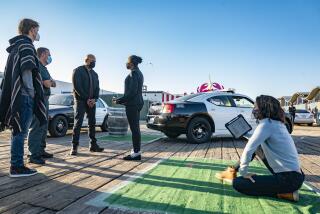Ford’s Idea Has Better Air as Goal
- Share via
Bidding to boost Southern California sales while adding an environmental feather to its cap, Ford Motor Co. said Tuesday that it will begin giving $1,000 credits to Southern Californians who agree to scrap their pre-1990 automobiles.
The credits will be good for down payments on new or late-model used vehicles at area Ford and Lincoln Mercury dealerships.
Ford officials say the pilot program, covering Los Angeles, Orange, Riverside and San Bernardino counties, could remove hundreds of older cars and trucks--many of them heavy polluters--from the region’s roads. A similar program run by Ford of Germany since 1994 has retired more than 300,000 older vehicles there, said Mark Hutchins, president of Ford’s Irvine-based Lincoln Mercury division.
While acknowledging that the program is intended to help market Ford products, Hutchins said it also underscores the auto maker’s commitment to help clean the air.
Ford introduced the program at a luncheon in Irvine as part of an effort to boost the Lincoln Mercury division’s visibility in Southern California. The luxury car unit this summer became the first car maker ever to establish its global headquarters in Orange County.
The scrapping program will run from Oct. 3 through Jan. 5. If successful, it could be expanded to other parts of the state or launched nationally.
Ford’s newly appointed chairman, William Clay Ford Jr., has been an outspoken champion of environmental issues and is expected to push the company to step up development of alternative-fuel vehicles and the use of recycled and other environmentally friendly materials.
Vehicle-scrapping programs have a checkered history in Southern California.
The South Coast Air Quality Management District has junked 22,000 vehicles since it started the initial effort in 1993. But new guidelines were drawn up last month after a district inspector found that there were few controls in place and that many of the vehicles being junked barely ran, so scrapping them did little to remove polluting vehicles from the roads.
The air-quality agency, which targets vehicles made in 1982 or earlier, uses independent contractors that pay owners $500 to $600 for the cars and trucks they turn in. The contractors are granted state smog credits for each vehicle scrapped and make their money selling those credits to businesses that use them to delay implementation of pollution-cleanup programs.
That practice spawned a lawsuit against AQMD by Communities for a Better Environment, a group representing residents of industrial communities around the Los Angeles Basin. The suit complains that vehicle scrapping harms such communities because it allows the postponing of measures to combat industrial air pollution.
Ford says it will avoid those problems.
By requiring participants to use their scrapping bounties to help buy new or late-model used cars, Ford will ensure that junked vehicles will be replaced with cleaner models, said Brian Janssen, manager of the company’s alternate-fuel and environmental-marketing program. And because it is privately funded, the Ford program won’t create smog credits that can later be used to delay environmental improvements, he said.
To avoid junking cars that aren’t polluting because they don’t work, Ford will require that vehicles traded in under the program be in running order.
“Our goal is to retire vehicles in roadworthy condition that have a few years of useful life left,” Hutchins said.
Ford’s program could anger local auto repair and restoration professionals, however, because it requires that the cars and all their parts be turned into scrap. Restorers say such programs rob the market of valuable original replacement parts.
More to Read
Inside the business of entertainment
The Wide Shot brings you news, analysis and insights on everything from streaming wars to production — and what it all means for the future.
You may occasionally receive promotional content from the Los Angeles Times.










